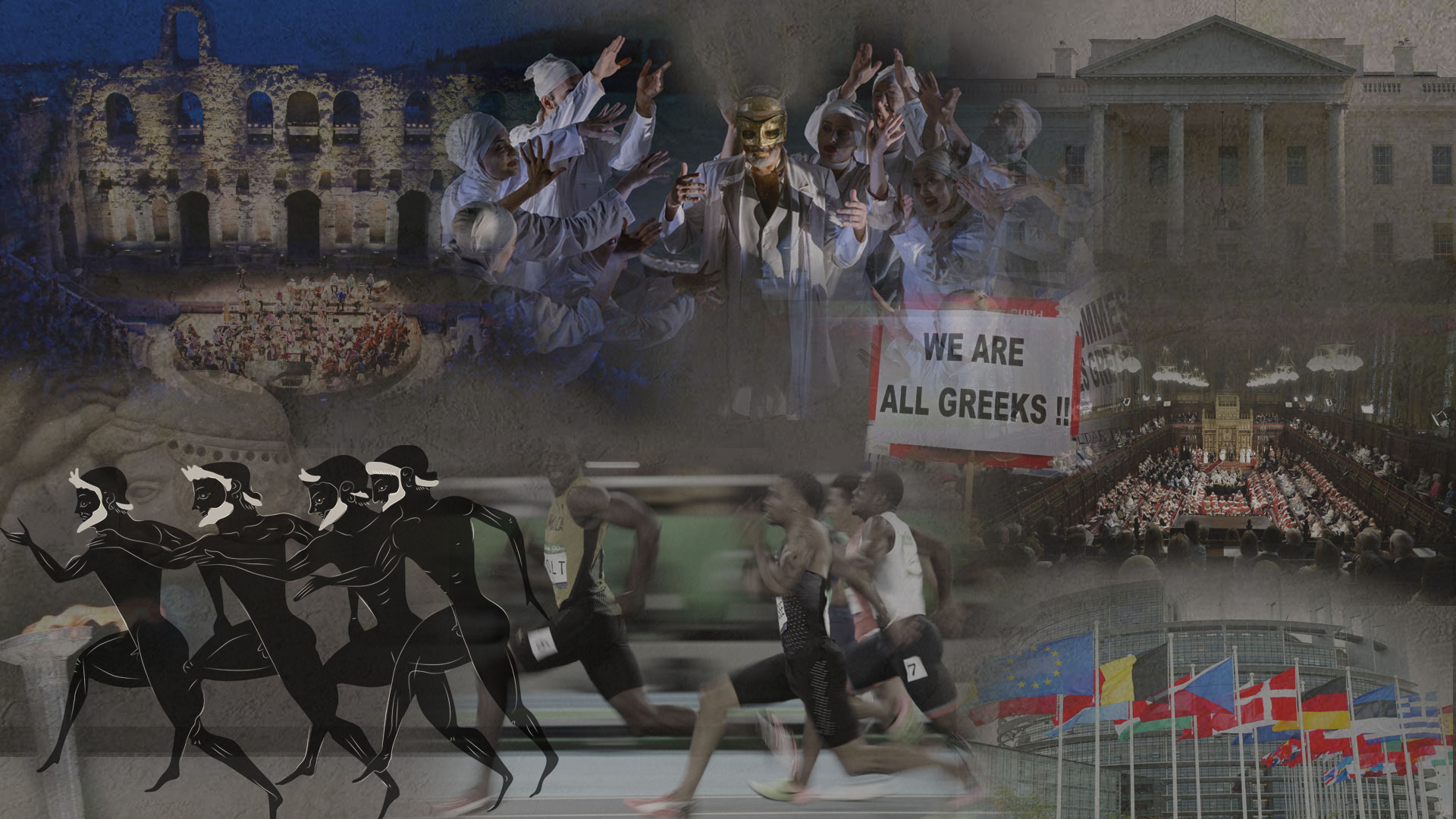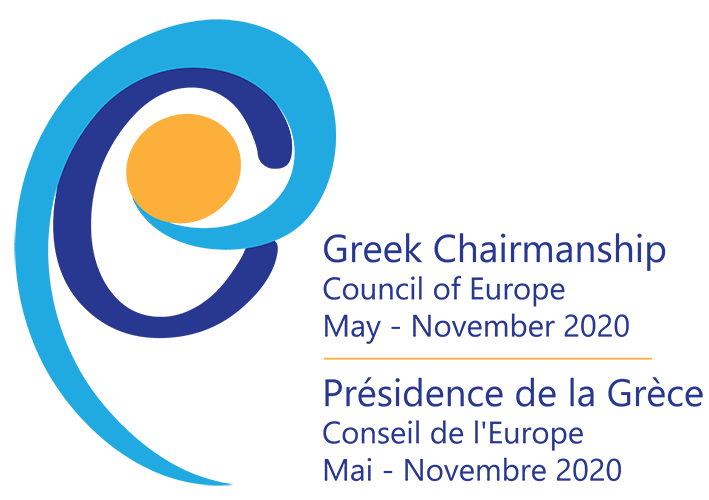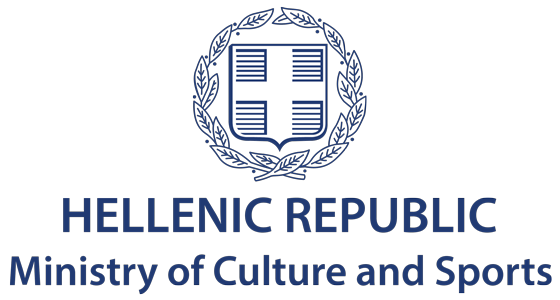Eunomia – Education – Freedom
Roman copy of an original work of 360 BC.
Marble. Height 0.18 m. From Athens.
National Archaeological Museum Γ 3735
Philosophy, Science, Education,
Theater, Sculpture, Painting, Architecture
Humans as autonomous entities in the context of organized society, the respect for their personality, freedoms and rights, were fundamental topics in the ancient Greek thought. From the Elegies of Solon (c. 630-560 BC) to the Democracy and Laws of Plato (428/7-348/7), the Politics of Aristotle (384-323/2 BC) and Demosthenes’ fiery speeches (384-323 / 2 BC), the ideas of justice, rule of law, decency, education, virtue and free thought stand out as key ingredients for the ideal regime.
Regimes of democratic principles developed from time to time in various cities in Greece but did not evolve. In Athens, on the contrary, democracy flourished in a unique way and established itself in the Greek world as the longest running example of city organization with institutional enhancement of the citizen, his obligations and rights, his freedoms and especially his value as individual and his ability to reason, express himself independently and live in harmony.
At the level of fundamental principles, the first steps of the Athenian state were influenced by the idea of justice, which played a catalytic role in the decisions relating to appeasing class conflicts, determining political affairs, and shaping institutions. Thus, at the end of the 7th c. BC, in the years of archon Aristaichmos (621/620 BC), the Athenian lawgiver Dracon put an end to the arbitrary disposition of the nobles in the attribution of justice by drawing up a code of criminal laws for various offenses such as homicide and theft.
At the beginning of the 6th c. BC, Solon advocated the rule of law, the good governance of the city, which smooths out the contradictions of social injustice caused by lawlessness. The granting of political rights to the Thetai, the economically weaker social class of Athens, and seisachtheia (the shaking off of burdens) by abolishing debt slavery, were key acts of the Solonian policy and paved the way for the democratic reforms of Cleisthenes (late 6th c. BC).
The established Athenian Democracy of classical times (462-322 BC) governed and expressed itself through three main principles: equality, equity and parity. The citizens of Athens knew that they were equal before the law, equal in terms of the right to speak, equal in terms of the honors bestowed upon them by the state.
The assembly of the deme was dominant in all matters of public life, that is the assembly of citizens, in which all Athenian men over the age of 20, who had fulfilled their military service (as teenagers), were eligible to participate. The assembly of the deme had the right to issue decrees on matters of religion, economy, city organization, domestic and foreign policy, which were ratified by vote. Every citizen had the right to speak at the meetings.
The representative body of the assembly of the deme was the boule (council) of the “five hundred”, which consisted of 500 Athenian citizens (fifty from each of the ten tribes) serving an annual term. The task of the council of the five hundred was to prepare the decrees, supervise the execution of the decisions taken by the assembly of the deme, inspect the implementation of the law, assess the city magistrates, manage public finances, and handle the external affairs. Over the sessions that were held daily in the bouleuterion, in the south part of the Agora, presided the prytaneis, namely 50 executive councilors from each tribe who were undertaking in rotation (for 1/10 of the year) the administration of the state.
Stelae with laws, financial decrees, alliance treaties, honorary decrees and other written texts of the Athenian state, were set up in sacred and public places, in visible and prominent spots in such a way that were easily accessible to citizens, who had to be kept uninterruptedly informed. All of the original decree texts were recorded in a special building in the Agora, the so-called Metroon (Registry).
In addition to the boule (council) and the assemble of the deme, the Athenian State had a large number of individual and collective authorities, in which all Athenian citizens had the right to participate. Important for the representation of all social classes in the numerous offices of the Athenian state, was the manner of selecting the magistrates by lot that was generalized in the 4th c. BC. However, all magistrates were supervised during their term of office, at the end of their tenure were accountable to the deme and could be deposed or even exiled.
The Athenian state honored active citizens for acts of social solidarity, offer of financial support to public works and flawless execution of their duties, so that they stood out as role models. Foreign citizens had the opportunity, depending on their contribution to the City and their commitment to democratic values, to gain legal protection, the right to own land and residence, and the right to hold the Athenian citizenship.
The favorable environment of the Athenian democracy allowed the free circulation of ideas and independent thinking in all domains. The ideal interaction between city and citizen led to the flourishing of philosophy, science, rhetoric, education and art and turned Athens into a unique center of culture during the 5th and 4th centuries BC.
The founder of Attic Philosophy was Socrates (469-399 BC). An Athenian citizen, who advocated the dialogue and critical thinking. By the example of his own life, he directed attention to the human being, to the value and substance of human existence. Among his top students was Plato.
Athens was the place that Aristotle of Stageira chose to live in from the age of 17. A metic himself (that is, without full Athenian citizenship), he was a student of Plato the Athenian and a member of the Platonic Academy and later he founded his own philosophical school, the so-called Peripatetic school, in the Lyceum of Athens. In the free environment of Athens, he taught and wrote on issues of ethics, logic, politics, rhetoric, law, music, art, theater, psychology, physics, biology and zoology. The work of the leading multidisciplinary scientist is described by Diogenes Laertius (V28) in 445.270 lines.
In 461 BC, Pericles introduced the institution of free theater tickets for the financially weak citizens, enabling all Athenians to attend the competitions in drama and cultivate their mind and taste for beauty. The great playwrights, Aeschylus (525-456 BC), Sophocles (496-406 BC), Euripides (480-406 BC) and Aristophanes (445-385 BC) performed their works in the Theater of Dionysos in Athens.
The ideology of the Athenian democracy was generally expressed in the humanitarian nature of education. Body and spirit were the two poles that composed the personality of the Athenian citizen.
The classical ideal of moderation, morality and inner balance that goes hand in hand with eunomia (rule of law), isonomy (equality before law) and isopolity (equality of rights) was expressed in various ways in the sculpture and painting of the era.
The symmetric, the beautiful, the complete and the self-sufficient that single out the Greek art of classical times, characterize architecture as well. “Become lovers of your city” is what Pericles urged his fellow citizens. With the construction of magnificent buildings such as the Parthenon, the Propylaea, the Erechtheion and the Temple of Athena Nike, the ingenious politician managed to realize his vision for this unique city, the city – school of the Greek world, as the cradle of democracy was acquiring an image appropriate for a large economic, political and cultural center.
“Forgotten” for many centuries, the values of the Athenian democracy were rediscovered by the Europeans of the Renaissance in the manuscripts of ancient Greek literature and rekindled the interest in classical antiquity, inspiring artistic currents and generating progressive ideas and movements such as Humanism and Enlightenment.
Nowadays, the intellectual achievements and attainments of the Athenian democracy are revived in the western art, theater, philosophy, political thought and modern state organization. The word “democracy”, which was implanted intact in the languages of the western culture, along with countless other words and concepts of the democratic value system, continues to be a dynamic element and a source of inspiration for contemporary collective pursuits.

SCIENTIFIC SUPERVISION – PLANNING – TEXTS
Dr Maria Lagogianni – Georgakarakos
Archaeologist, Director of the National Archaeological Museum
TEXT TRANSLATION
Dr Elisabeth Bargue, Art Historian – Museologist, Hellenic Ministry of Culture and Sports
TRANSLATION EDITING
Dr Katia Manteli, Archaeologist, National Archaeological Museum
Dr Evridiki Leka, Archaeologist, National Archaeological Museum
ADMINISTRATIVE SUPPORT
Kalliopi Sryrou, National Archaeological Museum
Gulielmos Nikolaidis, National Archaeological Museum
MANAGERIAL AND ACCOUNTING SUPPORT
DIRECTORATE OF INTERNATIONAL RELATIONS AND EUROPEAN UNION OF THE HELLENIC MINISTRY OF CULTURE AND SPORTS
Giorgos Kalamantis
Head of the Directorate of International Relations and European Union of the Hellenic Ministry of Culture and Sports
Marianthi Anastasiadou
Head of the Department of International Relations of the Directorate of International Relations and European Union of the Hellenic Ministry of Culture and Sports
Christina Karanasou
Executive of the Directorate of International Relations and European Union of the Hellenic Ministry of Culture and Sports
PHOTOS
ARTISTIC SUPERVISION
Athina Iakovidou, Art Director
PRODUCTION
Video production – Web Design by Printall LTD
Website development by Horizon


DIRECTORATE OF
INTERNATIONAL RELATIONS
AND EUROPEAN UNION OF
THE HELLENIC MINISTRY OF
CULTURE AND SPORTS

Copyright © 2020 National Archaeological Museum